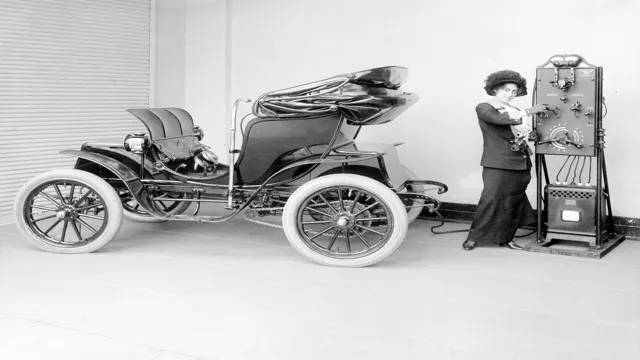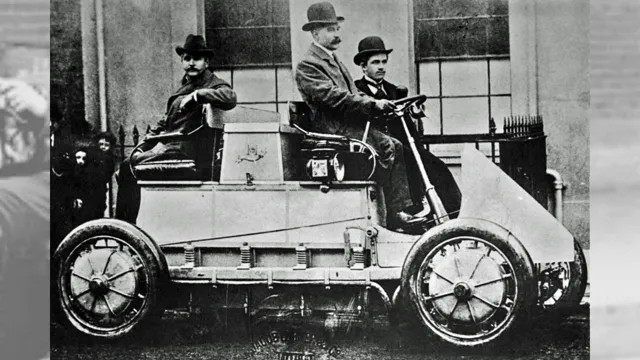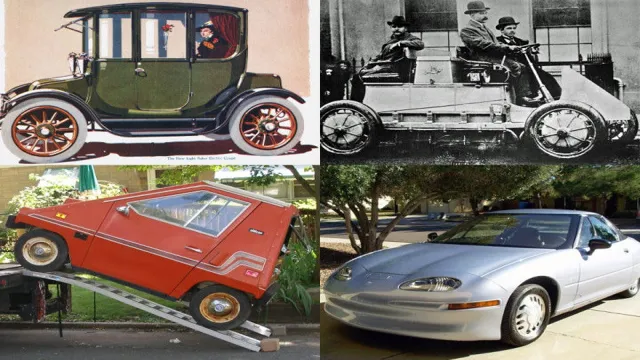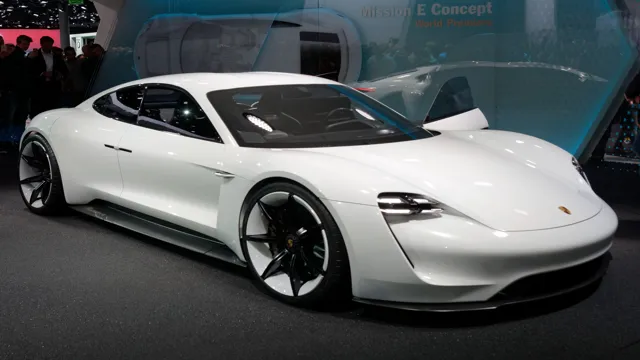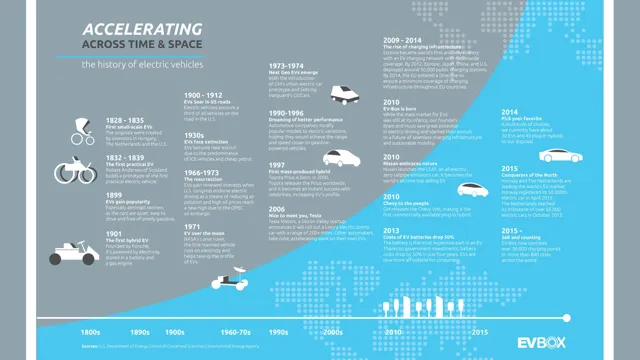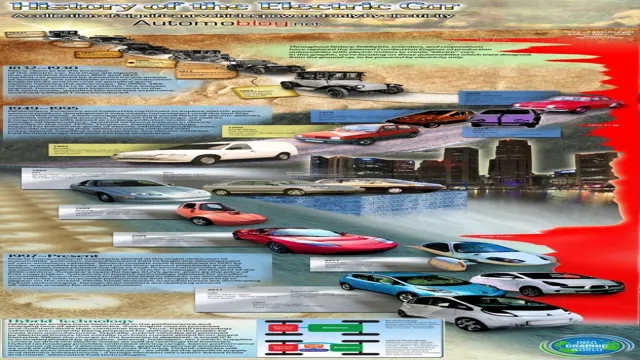Spark of Revolution: Delving into the Fascinating History Behind Electric Cars
Electric cars have become increasingly popular in recent years, from sleek Tesla models to more affordable options like the Nissan Leaf. But where did the idea for these vehicles come from, and how long have they been around? The history of electric cars is a fascinating journey of innovation, from early 19th-century experiments to the cutting-edge technology of today. In this blog, we’ll take a closer look at the birth of electric cars, their brief fall from grace, and their current resurgence as a sustainable and eco-friendly alternative to traditional gas-fueled vehicles.
Join us as we explore the past, present, and future of one of the most exciting developments in modern transportation.
Early Concepts
The history behind electric cars dates back to the early 19th century, where inventors like Thomas Davenport and Robert Anderson were experimenting with electric motors. Davenport’s electric carriage, which used a battery to power the motor, was one of the earliest designs for an electric vehicle. During this time, electric cars were more popular than gasoline-powered vehicles due to their quiet operation and lack of harmful emissions.
However, the limited range of these vehicles made them impractical for long-distance travel. In the early 20th century, gasoline-powered vehicles became more popular, and electric cars faded into the background. It wasn’t until the 1990s that electric cars regained popularity, thanks to advancements in battery technology and environmental awareness.
Today, electric cars are becoming more accessible and affordable, with major car manufacturers offering electric models and infrastructure for charging stations expanding. It’s exciting to see the potential of electric cars and the positive impact they can have on the environment.
1800s – Early 1900s
During the 1800s and early 1900s, early concepts of technology emerged that would lay the foundation for decades to come. These ideas were often met with skepticism and resistance, but they eventually proved to be groundbreaking. One such concept was the electric telegraph, which paved the way for modern communication.
Developed in the early 1800s, it allowed information to be transmitted rapidly across long distances, revolutionizing communication between individuals and businesses. Another early technological concept was the steam engine, which transformed the manufacturing industry by enabling mass production of goods. The steam engine was also crucial in the development of railways, which were essential in the transportation of goods and people.
These early technologies may seem primitive by today’s standards, but they were crucial in the advancement of modern society.

Thomas Davenport’s Creation
Thomas Davenport is widely considered to be the creator of the first ever electrical spinning machine, which was patented in 183 This machine was a milestone in the history of the textile industry, as it revolutionized the process of spinning yarn and thread. Davenport’s early concept was based on Michael Faraday’s principle of electromagnetic rotation, and he utilized this principle to create a machine that could spin multiple spindles of thread at once.
The machine was powered by a simple battery, which made it much easier to use than the steam-powered machines of the time. This invention laid the foundation for the development of modern electrical machinery and helped usher in a new era of industrialization. Even today, Davenport’s creation serves as a testament to the power of innovation and human ingenuity.
Milanese Inventors
Milanese inventors are known for their creativity and innovation. Early concepts developed by these inventors paved the way for several important inventions. One of the earliest concepts developed was the printing press, which was invented by a Milanese printer named Francesco Rampazetto.
He came up with this concept in the late 16th century, which proved to be a major milestone in the world of publishing. Milanese inventors also had a significant impact on transportation. In the early 19th century, a Milanese inventor named Giuseppe Bianchi developed a steam-powered carriage, which was one of the earliest attempts to create a vehicle that could travel without the use of horses.
These early concepts were the foundation of several important inventions that revolutionized different industries. From publishing and transportation to manufacturing and healthcare, Milanese inventors have made valuable contributions that have significantly impacted our world today.
Revival & Advancements
The history behind electric cars dates back to the late 19th century, when electric vehicles were first introduced and quickly gained popularity. However, due to limitations in battery technology and the rise of gasoline-powered cars, electric cars fell out of favor and were largely forgotten. It wasn’t until the early 21st century that electric cars saw a revival and advancements in technology allowed for longer battery life and faster charging times.
Today, electric cars are becoming more common on the roads as people look for more sustainable and eco-friendly modes of transportation. This shift to electric cars is largely driven by the need to reduce carbon emissions and slow down the effects of climate change. Through continued innovation and investment, the future of electric cars looks bright, and it seems inevitable that they will play a crucial role in the transition to a greener and more sustainable world.
The 90s Resurgence
The 90s Resurgence in the fashion industry has brought back some of the most iconic styles and trends of that era. From chunky platform shoes to baggy jeans, fashion enthusiasts around the world are once again sporting these retro trends with a modern twist. The revival of the 90s has also brought some advancements in fabrics and designs, making the fashion industry more sustainable than ever before.
For example, brands are now using recycled materials for their clothing lines, and some have even incorporated AI technology to optimize production processes. The 90s resurgence has not only made fashion more fun and exciting, but it has also allowed the industry to become more responsible towards the environment. So, whether you are a fan of grunge or hip-hop fashion, the 90s Resurgence has something for everyone.
Tesla’s Role
When it comes to the revival and advancements of the electric car industry, Tesla is definitely leading the way. Elon Musk’s brainchild has not only paved the way for the mass production of electric vehicles but has also redefined people’s expectations of what an electric car can do. With features like autopilot and Ludicrous mode, Tesla’s electric cars have made driving a whole new experience.
Moreover, with its network of supercharging stations and advanced battery technology, Tesla has tackled the limitations of electric cars head-on, transforming the concept from a novelty to a practical solution. As a result, other automakers have taken notice and begun to invest heavily in the development of their own electric cars. Simply put, Tesla is revolutionizing the way we think about transportation, and in doing so, reshaping the automotive industry as a whole.
Economic & Environmental Benefits
With the advancement of technology, there is a scope for revival and progress in the economy while improving the environment. The use of sustainable technologies and practices can benefit both the economy and the environment. One example of this is the switch to renewable energy sources such as wind, solar, or hydroelectric power.
This shift not only reduces carbon emissions but also results in significant monetary savings in the long run due to decreased reliance on non-renewable resources. Additionally, sustainable agriculture practices such as crop rotation, reduced tillage, and use of organic fertilizers can improve soil health, reduce water use, and result in increased crop yields. Moreover, the implementation of green technologies can create job opportunities in various sectors, leading to economic growth.
In conclusion, reviving the economy and advancing technology in a sustainable way can bring about numerous economic and environmental benefits for future generations.
The Future of Electric Cars
The history behind electric cars is not a new concept. In fact, the first electric car was built in the late 1800s by Thomas Parker. However, it wasn’t until the early 2000s that electric cars started gaining popularity again due to advancements in technology and increased concerns about environmental sustainability.
Since then, major car companies such as Tesla, Nissan, and Chevrolet have been producing electric cars with longer ranges and faster charging times. As more and more countries pledge to achieve net-zero emissions, it’s likely that the demand for electric cars will continue to rise. In addition, innovations in battery technology and renewable energy sources may also make electric cars more accessible and affordable for the average consumer.
While there are still challenges to overcome such as infrastructure and accessibility issues, the future of electric cars looks promising.
Increasing Popularity & Demand
As we look to the future of the automotive industry, it is clear that electric cars will only continue to grow in popularity and demand. With concerns over climate change and the push towards more sustainable energy sources, it is no surprise that more and more people are opting for electric vehicles. In fact, sales of electric cars increased by over 40% in 2020 alone.
It’s not just individuals who are driving this trend either, as major companies and governments around the world are setting ambitious targets to electrify their vehicle fleets. Electric cars still face some challenges, such as the need for more charging infrastructure, but as technology advances and prices become more competitive, it is clear that electric cars are the future of transportation.
Advancements in Technology
Electric cars have come a long way in recent years, and the future looks bright for these environmentally friendly vehicles. With advancements in technology, we can expect to see electric cars that are more efficient, affordable, and reliable than ever before. One of the biggest challenges facing electric car manufacturers is the limited range of these vehicles on a single charge.
However, newer models are now able to travel longer distances, with some electric cars boasting a range of over 300 miles on a single charge. In addition, new charging technologies are being developed that will enable faster and more convenient charging of electric cars. With these advancements, electric cars are becoming a more viable option for everyday drivers who want to reduce their carbon footprint.
As more and more people make the switch to electric cars, we can expect to see even greater innovations in this space in the coming years.
In Conclusion
From the early horseless carriages to the sleek, modern models of today, the journey of electric cars has been nothing short of electrifying. As society began to focus on environmental impact and fuel efficiency, electric cars have emerged as a clear front-runner in the race for sustainable transportation. With advancements in technology and infrastructure, electric cars are becoming more accessible for everyone.
So, the next time you hit the road in your electric car, remember the rich history behind it and revel in the fact that you are driving the future of transportation.”
FAQs
When was the first electric car invented?
The first electric car was invented in 1837 by a Scottish inventor named Robert Davidson.
How do electric cars work?
Electric cars work by using an electric motor powered by rechargeable batteries, which convert electrical energy into mechanical energy.
Are electric cars environmentally friendly?
Electric cars produce zero emissions at the tailpipe, making them much more environmentally friendly than traditional gasoline-powered cars.
What is the driving range of an electric car?
The driving range of an electric car depends on the model and battery capacity, but can range from 100 to 400 miles on a single charge.
